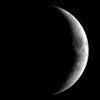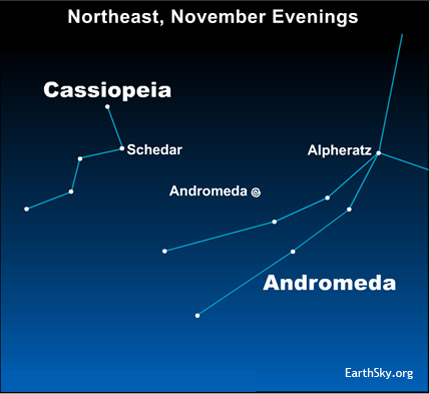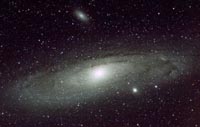Courtesy of EarthSky
A Clear Voice for Science
www.EarthSky.org

 David Smith of Michigan wrote, “What is the easiest way to find the Andromeda galaxy at this time of year?” “I tried a couple times with my telescope, but had no luck.”
David Smith of Michigan wrote, “What is the easiest way to find the Andromeda galaxy at this time of year?” “I tried a couple times with my telescope, but had no luck.”
Dave, the image at right shows the view of the Andromeda galaxy through a telescope. We hope you are not looking through the eyepiece of your telescope when sweeping through the sky for this galaxy. That would be hard. You need a wider field of view to spot the galaxy.
For starters, try scanning for the Andromeda galaxy with the unaided eye or binoculars. In a dark sky, you might spot it, as the early stargazers did before the days of star charts and optical air. The Andromeda galaxy is a large hazy patch in the night sky.
 However, what if you can’t find it just by looking in a dark sky? Some stargazers star-hop via the W-shaped constellation, Cassiopeia, shown on our chart today. Cassiopeia appears in the northeast sky at nightfall and swings high to the north as evening progresses. Note that one half of the W is more deeply notched than the other half. This deeper V is your “arrow” in the sky, pointing to the Andromeda galaxy.
Use Great Square of Pegasus to find Andromeda galaxy
However, what if you can’t find it just by looking in a dark sky? Some stargazers star-hop via the W-shaped constellation, Cassiopeia, shown on our chart today. Cassiopeia appears in the northeast sky at nightfall and swings high to the north as evening progresses. Note that one half of the W is more deeply notched than the other half. This deeper V is your “arrow” in the sky, pointing to the Andromeda galaxy.
Use Great Square of Pegasus to find Andromeda galaxy
Remember, on a dark night, this galaxy looks like a faint smudge of light. Once you have found it, try again with binoculars or your telescope. The Andromeda galaxy is the nearest large spiral galaxy to our Milky Way. It is about 2.5 million light-years away, teeming with hundreds of billions of stars.
More about M31: Great galaxy in Andromeda
Written by EarthSky
Astronomy Picture of the Day from NASA/JPL
U.S. Naval Observator Astronomical Information center
The York County Astronomical Society
 Print This Post
Print This Post








